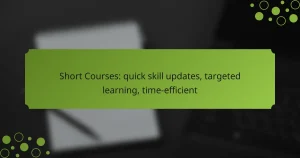
Specialization tracks offer a focused approach to career advancement by diving deep into high-demand skills that align with industry needs. Led by experts, these courses provide practical knowledge and real-world applications, enhancing both employability and promotion potential. Participants typically need foundational knowledge and technical skills to fully benefit from these targeted learning experiences.

What are the best specialization tracks for career advancement?
The best specialization tracks for career advancement focus on high-demand skills that align with industry needs. These tracks provide targeted knowledge and practical experience, enhancing employability and potential for promotions.
Data Science and Analytics
Data Science and Analytics is a rapidly growing field that emphasizes the extraction of insights from data. Professionals in this area use statistical tools and programming languages like Python and R to analyze large datasets, helping organizations make informed decisions.
To excel in this specialization, consider mastering key concepts such as machine learning, data visualization, and statistical analysis. Online courses and certifications can provide structured learning paths, often ranging from a few weeks to several months.
Digital Marketing Strategies
Digital Marketing Strategies focus on promoting products and services through online channels. This specialization covers areas like SEO, content marketing, social media, and email campaigns, which are essential for reaching modern consumers.
To succeed, familiarize yourself with tools like Google Analytics and social media advertising platforms. Practical experience through internships or projects can significantly enhance your understanding and effectiveness in this dynamic field.
Cybersecurity Fundamentals
Cybersecurity Fundamentals is crucial for protecting information systems from cyber threats. This track covers essential topics such as network security, risk management, and compliance with regulations like GDPR and HIPAA.
Consider obtaining certifications like CompTIA Security+ or Certified Information Systems Security Professional (CISSP) to validate your skills. Hands-on experience through labs or simulations can also prepare you for real-world challenges in cybersecurity.
Project Management Essentials
Project Management Essentials equip professionals with the skills to lead projects efficiently. This specialization includes methodologies like Agile and Waterfall, focusing on planning, execution, and monitoring of projects to achieve specific goals.
To advance in this area, consider pursuing a Project Management Professional (PMP) certification. Practical experience managing projects, even on a small scale, can provide valuable insights into effective project leadership.
Software Development Practices
Software Development Practices emphasize the methodologies and tools used in creating software applications. This track includes learning programming languages, version control systems, and software development life cycles.
Familiarity with Agile methodologies and tools like Git can enhance your development skills. Engaging in coding bootcamps or contributing to open-source projects can provide practical experience and improve your employability in the tech industry.

How do expert-led online courses enhance learning?
Expert-led online courses enhance learning by providing direct access to industry professionals who share their knowledge and experiences. This approach not only deepens understanding but also aligns educational content with real-world applications, making it more relevant for career advancement.
Access to Industry Leaders
Access to industry leaders in expert-led courses allows learners to gain insights from those actively shaping their fields. These professionals often share current trends, best practices, and insider knowledge that can significantly enrich the learning experience.
Participating in Q&A sessions or live discussions with these experts can clarify complex topics and provide networking opportunities. Engaging with leaders can also inspire learners to pursue specific career paths or specializations based on firsthand accounts of industry challenges and successes.
Real-World Case Studies
Real-world case studies are integral to expert-led courses, as they illustrate theoretical concepts through practical examples. These case studies often reflect actual scenarios that professionals face, allowing learners to analyze and apply their knowledge in context.
By examining case studies, students can develop critical thinking and problem-solving skills. They learn to navigate challenges similar to those encountered in their chosen industries, preparing them for real-life situations. This method of learning also encourages collaboration and discussion among peers, further enhancing the educational experience.

What are the prerequisites for specialization tracks?
Prerequisites for specialization tracks typically include foundational knowledge in relevant fields and a solid assessment of technical skills. These requirements ensure that participants are adequately prepared to dive deep into specific areas and gain the expertise necessary for career advancement.
Basic Knowledge in Relevant Fields
Having basic knowledge in relevant fields is crucial for anyone looking to pursue specialization tracks. This foundational understanding allows participants to grasp advanced concepts more effectively and apply them in practical scenarios. For example, a background in computer science is often essential for specialization in data science or machine learning.
Consider reviewing core topics related to your chosen specialization. This might include programming languages, statistical methods, or industry-specific regulations. Engaging with introductory courses or resources can help solidify this knowledge before diving deeper.
Technical Skills Assessment
A technical skills assessment is vital to determine your readiness for a specialization track. This assessment can take various forms, such as quizzes, coding challenges, or practical projects, and helps identify areas of strength and those needing improvement. For instance, aspiring software engineers may need to demonstrate proficiency in algorithms and data structures.
To prepare for this assessment, focus on honing relevant technical skills through practice and real-world applications. Utilize online platforms that offer coding challenges or project-based learning to build confidence and competence. Avoid underestimating the importance of this step, as it can significantly impact your success in the specialization track.

How to choose the right specialization track?
Choosing the right specialization track involves assessing your career aspirations, market trends, and personal interests. A well-aligned track can enhance your expertise and improve job prospects in your desired field.
Career Goals Alignment
Aligning your specialization track with your career goals is essential for long-term success. Start by identifying your professional aspirations and the skills required to achieve them. For instance, if you aim to become a data scientist, consider tracks focusing on machine learning or data analytics.
Evaluate the skills you currently possess and those you need to develop. Create a list of potential specialization tracks and rank them based on how well they support your career objectives. This will help you make an informed decision.
Market Demand Analysis
Understanding market demand is crucial when selecting a specialization track. Research current job trends in your industry to identify which skills are in high demand. For example, fields like cybersecurity and artificial intelligence are experiencing significant growth, making related specializations more valuable.
Utilize job boards, industry reports, and professional networks to gather insights on the skills employers are seeking. Consider reaching out to professionals in your desired field for advice. This analysis will help you choose a track that not only interests you but also offers strong career opportunities.

What are the costs associated with online specialization courses?
The costs of online specialization courses can vary widely based on the institution, course length, and subject matter. Generally, students should expect to pay anywhere from a few hundred to several thousand dollars for these programs.
Tuition Fees Overview
Tuition fees for online specialization courses typically range from around $300 to $3,000, depending on the provider and course complexity. For instance, well-known universities may charge higher fees due to their reputation and the quality of instruction.
Some platforms offer subscription models, allowing students to pay a monthly fee for access to multiple courses, which can be more economical for those looking to explore various topics. Always check if the course includes additional costs for materials or exams.
Financial Aid Options
Many online education providers offer financial aid options to help students manage costs. This can include scholarships, grants, or payment plans that allow for more flexible budgeting.
Students should research specific financial aid opportunities available through their chosen institution. Additionally, some employers may offer tuition reimbursement programs, which can significantly reduce out-of-pocket expenses for employees pursuing specialization courses.

What proof of expertise do online courses provide?
Online courses provide proof of expertise through certifications, skill assessments, and project portfolios. These elements demonstrate a learner’s knowledge and abilities in specific areas, making them valuable for career advancement.
Certifications
Certifications from reputable online courses serve as formal recognition of a learner’s skills and knowledge. They often require passing assessments or completing projects, which validates the learner’s understanding of the subject matter. Many employers recognize these certifications as credible indicators of expertise.
Skill Assessments
Skill assessments are tests or quizzes that evaluate a learner’s proficiency in specific topics. These assessments can range from multiple-choice questions to hands-on projects. Successfully completing these assessments not only reinforces learning but also provides tangible proof of skills that can be showcased to potential employers.
Project Portfolios
Creating a project portfolio during an online course allows learners to apply their knowledge in real-world scenarios. This portfolio can include case studies, coding projects, or design work, depending on the field of study. A well-curated portfolio is an effective way to demonstrate expertise and practical experience to employers.


